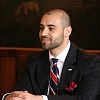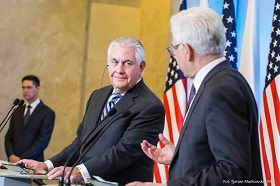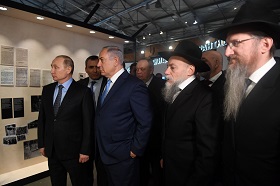It has already been one year since Donald Trump took the office and became the 45th President of the United States of America, so it’s understandable (and even required) to look back at his election promises and slowly emerging US foreign policy which is starting to take more definite shape.
As a foreign observer, who for this very reason will refrain from assessing the domestic implications of President Trump’s policies, I would like to concentrate on those issues which are of our mutual concern, and where my personal background and professional experience could, I very much hope so, shed some light on areas of our mutual interest. The things which are of great significance to the American people and rest of the world.
This will most definitely include the 73rd anniversary of the liberation of Auschwitz-Birkenau (which takes place this year and is associated with the topic of Jews and Israel), Poland (which reflects on the former and defines the near future of Europe and its business doings related to Nord Stream 2 project), and Russia (which relates to all the mentioned points and defines the future performance of the mentioned actors).
Jews, Europe, Russia and the State of the America First Diplomacy
It has already been one year since Donald Trump took the office and became the 45th President of the United States of America, so it’s understandable (and even required) to look back at his election promises and slowly emerging US foreign policy which is starting to take more definite shape.
As a foreign observer, who for this very reason will refrain from assessing the domestic implications of President Trump’s policies, I would like to concentrate on those issues which are of our mutual concern, and where my personal background and professional experience could, I very much hope so, shed some light on areas of our mutual interest. The things which are of great significance to the American people and rest of the world.
This will most definitely include the 73rd anniversary of the liberation of Auschwitz-Birkenau (which takes place this year and is associated with the topic of Jews and Israel), Poland (which reflects on the former and defines the near future of Europe and its business doings related to Nord Stream 2 project), and Russia (which relates to all the mentioned points and defines the future performance of the mentioned actors).
It is fair to say that despite of fierce attempts to label Donald Trump as ‘anti-Semite’ during his electoral campaign, it’s rather fair to say that Jews and Jewishness have never been so intensely discussed before as they have been lately.
Partially due to having Jewish family members, and largely do the bold and unexpected decision to move the US embassy in Israel to Jerusalem by the end of 2019, Trump has assured his detractors and Jews living in Israel that those accusations are unfunded - or at least very difficult to challenge.
In November 2005, the UN General Assembly established the International Holocaust Remembrance Day by choosing the liberation of the Auschwitz-Birkenau camp by the Soviet army on January 27, 1945 as a date for celebration. It’s therefore understandable why Rex Tillerson scheduled his visit to Poland in late January, after visiting London, Paris and the economic forum in Davos.
The importance of this visit was of double nature, as the US Secretary of the State not only aimed at commemorating the tragedies and suffering of the Jewish people in the past, but also had strategic implications which translated into meeting with key politicians in America's historical ally, Poland.
“Poland, I think as everyone knows, is a great democratic ally of the United States. Our ties go back to the days of the American Revolution when Polish officers helped us win our fight for independence. Our discussions today built on President Trump’s visit to Warsaw this past summer (…) I think everyone can appreciate that security is always front and center in all of America’s international relationships, and none any more important than here in Poland,” Rex Tillerson acknowledged at the press conference with Polish Foreign Minister Jacek Czaputowicz on January 27, 2018.
Since the commemoration service was planned after the Jewish Sabbath, the US Secretary of State had plenty time to address strictly political issues related to the growing significance of the US-Polish strategic relationship in the fields of security, business and energy.
“The United States continues to oppose Nord Stream 2 (…) [it] would continue to keep Europe more dependent on Russia for natural gas. It also allows Russia to now use the natural gas supply system as a political tool to create more pressure on countries like Ukraine and elsewhere. So we think it is — it’s not a helpful piece of infrastructure in terms of providing stability for all of Europe,” Tillerson assessed the project that would seek to connect Russia and Germany. He also added that he “believes that this project has got negative geopolitical implications.”
To understand this stance, it is worthwhile to remember that the US has recently become very active in the area of liquefied natural gas (LNG) exports to Central and Eastern Europe to challenge Russia’s position as main European supplier in Europe, with the first US LNG supply being despatched to Poland on June 7, 2017.
Nonetheless, despite arguing that its sole motive is to help Europe to diversify its energy supplies, it is hardly to see anyone besides Poland being happy with this idea.
“I think we have to recognize, though, that Nord Stream 2 does have significant European investment in the project, so not everyone is likeminded on the issue of Nord Stream 2 and the impact it can have on the overall stability of Europe and European energy security,” complained Secretary of the State in Warsaw.
Indeed, the Nord Stream 2 has its strong backers in the French Engie, Uniper and Winterhall from Germany, OMV from Austria, and Shell, which are quite determined to continue with the project, despite the US sanctions.
The message coming from Rex Tillerson, before he attended the main part of his visit to Poland, could suggest that the US wants to position itself with Poland against countries like France, Germany, and obviously Russia. The move, which appears to be risky at the time of global uproar against ‘America First’ in general, and President Trump in particular, is in Poland’s best interest to materialize its Three Seas Initiative — something which is perceived by other European countries as a counterweight to the EU dominated by the Western countries at least, and as a revanchist project aimed at Germany and Russia at most.
After finishing the press conference, Secretary Tillerson paid his respects in a solemn ceremony at a memorial to the prosecuted Jews who died revolting against German Nazi forces in the tragic uprising of 1943 in Polish capital, and laid a wreath at the Warsaw Ghetto Heroes Monument.
“On behalf of the American people, I’m honored today to recognize, along with our Polish friends, and commemorate the 73rd anniversary of the liberation of Auschwitz-Birkenau. Auschwitz-Birkenau was a place of unimaginable horror and tragedy, and it — but we must remember what happened there and in similar camps under the Nazi reign of terror,” Rex Tillerson told the gathered audience.
Nevertheless, if we ought to believe that this important tribute from the US Secretary of State should be as concrete as the military and business issues discussed during the preceding press conference, it is begging the question why Secretary Tillerson didn’t make the slightest diplomatic attempt to extend the olive branch to Russia on this special occasion — knowing that one of the Donald Trump’s election promises was to normalize the relations with Moscow.
As I am a lawyer and a person who served in the foreign service, I always believed that the main difference between an ordinary and outstanding diplomat is their ability to exploit any opportunity, which would serve its country’s (and people’s) interest. And on this occasion, Mr Tillerson proved to be the former, as it was in his country’s best interest to remind at that time that it were the Soviet forces who liberated Auschwitz — the well-known fact, which could be used as a platform to build a bridge to dialogue. Sadly, it wasn’t the case.
Either out of fear of deepening the anti-Russian backlash at home or providing an ammunition to the growing number of Donald Trump’s detractors, Secretary Tillerson failed to cease possibly the best opportunity to start a dialogue with Moscow. What is more, as the world is not waiting for the US to catch up with its rapid developments, it was none other than Benjamin Netanyahu who proved to be a far more skilful and pragmatic diplomat when he decided to attend the event devoted to International Holocaust Remembrance Day and the anniversary of the complete lifting of siege of Leningrad on January 29, 2018 in Russia, together with President Vladimir Putin.
“My friend, Mr President, I would like to thank you for the invitation to visit this impressive Jewish Museum and Tolerance Centre. I must add that I know this museum would not have been established without your assistance. I was very excited to see the description of the history of our nation in Russia, including the current period when Jewish life in Russia is thriving, largely owing to the support of the authorities and your personal support,” said Israeli Prime Minister.
After complimenting Putin and his nation, Netanyahu assured him that Jews will “never forget the role played by the Soviet Army in this victory,” as well as added that he is “willing to testify that among the world leaders there are few who understand it as well as Putin.”
As a matter of fact, these very words could be aimed at President Trump, who failed the Jews by not going to the monument in Warsaw, which was an indispensable part of the previous US presidents’ visits for over the last 30 years.
According to Anna Chipczynska, the leader of the Warsaw Jewish Community who was with Tillerson at the monument on Saturday, President Trump showed a “lack of understanding” by not visiting the monument last year.
In my own view, coming from an ordinary man of Polish-Jewish descent whose city of Lodz was liberated by Soviet troops 73 years ago, Trump and his Administration showed also a lack of knowledge how the effective diplomacy should be done in an ever more polarized world, where the US can soon find itself being left behind.






